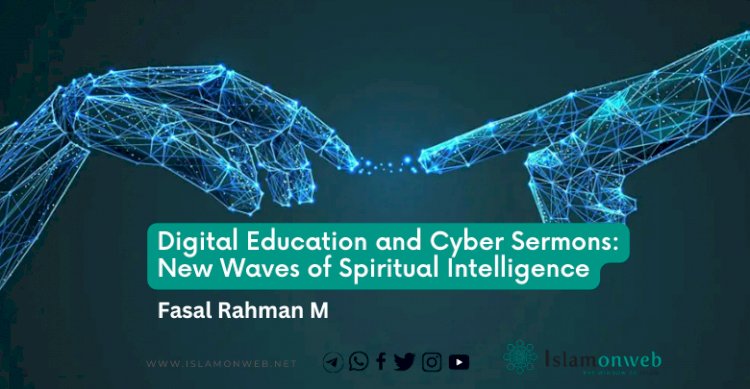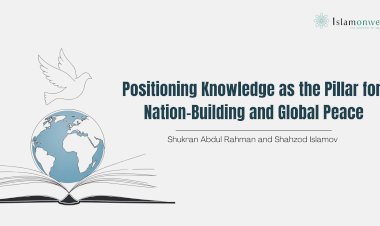Digital Education and Cyber Sermons: New Waves of Spiritual Intelligence
From time immemorial, spirituality has been a part of human civilization in distinct forms and it has transformed several kinds but its connotations and essence remained unchanged for centuries. Since the proliferation of technological means and advancing digital space, people have sought to develop spiritual practice through booming technology. When the internet and virtual platforms were developed along with entertainment factors, spiritual sermons were encouraged and practised in several ways. Before the prevalence of digital means for such elements, religion and religiosity which are the ostensible causes of spiritual empowerment were transmitted through massive dissemination of knowledge by scholars of specific religions. But, when the pandemic hit world got trampled without being heard outside, and each person turned out to need spiritual strength, digital means such as virtual platforms became rampant to enhance spiritual intelligence in people.
In Islam, even before the waves of the pandemic, the utilization of the internet had been pervasive among people for spiritual causes, but these sermons were quite different for the lack of transmitting the causes of spiritual intelligence. Spirituality represents a universal human attribute of relatedness to the non-material reality commonly expressed in terms of awareness of transcendent dimensions. Disregarding the perspectives of religion, the distinction between spirituality and spiritual intelligence is that spirituality is to know who you are, and the latter is to realize who you are and live life in that awareness.[i]
As far as digital religion is concerned, it has played a crucial role in advancing the spiritual aspect of society, bringing significant changes that created a much more noticeable impact. Regardless of place and time, religious content has become accessible increasingly and has led to the creation of multiple virtual communities which are widely recognized to encourage practising the religion in ways that were not previously possible. Cyberspace has also enabled people to explore the wide variety of diversity in religious activities and distinct traditional ways of practising religion. Along with that, new cyber sects and religious movements have emerged, primarily online or virtually. Eventually, people can comprehend the world’s disparate religions anonymously and choose the right without any biased approaches.
In Islamic methodology of practising, it upholds a nuanced view to perform the religion and access spirituality through technological means. Many traditional scholars have imparted the disapproval and disengagement of spiritual development through digital means for the concerns over the potential adverse effects of technology which can lead to distraction from spiritual practice and leading to a lack of focus and discipline from one’s religious practice. Adding to it, they also concerned the intriguing access to information provided by technology may lead to the superficial interpretation of Islamic teachings and lack of critical engagement with religion, and loss of privacy of specific spiritual traditional practices. At the same time, other scholars suggested that it can be used to facilitate the practice of Islam and connect Muslims. Given the Islamic concept of knowledge pursuit, digital technology grants broad access to religious sources and Islamic texts which hypothetically disseminate the knowledge. It allows individuals to connect with other people and engage with them to deepen their knowledge and relate to each other in the spirit of a community.

Considering the pandemic hit period, people were desperately pursuing the haven of spirituality when the impasse was doomed over each individual. Globally, religious cyber sermons have played a pivotal role to ease the gruesome situation and have become prevalent among people regardless of borders. Prolific scholars of specific religions tenaciously engaged to release religious sermons in different ways, and among them, the most popular is the congregation of benedictions. In Islamic cyber sermons established in Kerala, the widespread deployment of several channels broadcasted through online platforms like YouTube, Facebook, and Instagram grabbed the attention. Eventually, it made a large population of audience on a daily basis. They are still progressive, providing many incumbent teachings and spiritually guiding people. But along with claiming its stellar progression, its wide acceptance has brought many changes in traditional spiritual congregations. It poses some challenges for individuals and communities dealing with the Islamic methodology of spiritual enhancement.
Every Islamic teaching is accepted by its incredibility of quality and authenticity. Because of the ease of facilitation of usage, education, and proliferation of cyber sermons, the content may lose its quality and authenticity. The intensity of technology usage and online platforms may trigger addiction, distraction, and even loss of accountability, which is bound to in-person services. As for religious institutions, the impact of cyber sermons has severely affected their organization and operation. The public sermons were considered the prime factor of their monetary empowerment, while the online platforms were deduced in their income generation.
On the other hand, looking to the bright side, these cyber-sermons are to be considered the spiritual guides of the community and, thanks to pervasive ideology, increase the connection between communities. People are interested in engaging with these virtual congregations and are excited to carry out religious practices as per the guidelines of speakers in virtual platforms.
The spiritual intelligence of an individual can be traced by examining the presence of specific principles or implications. As per Dana Zohar[ii] and Ian Marshall, who introduced the concept of spiritual intelligence, theoretically, a person belongs to self-awareness that he knows what he believes in and values and what deeply motivates him to live and be spontaneous at the moment and be capable to see something that inspires us and is led by a vision, holism that seeing larger patterns of relationships and connections having a sense of belonging and valuing other people for their differences not despite them being down to earth and learning and growing from mistakes setbacks and suffering. So spiritual intelligence can be fostered by applying these principles[iii].
In a study of Islamic spiritual intelligence done by Malaysian scholar Zanariah Abdul Rahman, the measurement of quotient was identified by the four characteristics of prophethood; ṣidq (truthfulness), amānaẗ (responsible), tablīġ (deliver), and faṭānaẗ (Wisdom). On the other hand, these features deliver contemporary spiritual intelligence which measures the cores of critical existential thinking, personal meaning production, transcendental awareness, and conscious state expansion[iv].
Owing to the seamless acceptance and intensity of watching virtual congregation, people have changed substantively, and looking at the scales it’s quite dubious about ensuring these cyber sermons are possible to create such characteristics in the community. As an individual part of a Muslim, everything related to spirituality is connected with personal improvement and is neither supported by the community nor assessed by society. Thus, if a person could enhance his spirituality through virtual sermons in this contested world, he may proceed without veering off the path he chose rightly. Therefore, existing the potential challenges if the community could accelerate into divinity in the way of evading the objections grounded on the scenario, Islam as a religion of all time this inevitable paradigm shift is appreciated, and upcoming challenges related to the digital civilisation like trans humanism are quite contentious.
References:
- Sharmila Dhote, Relationship between Spirituality, Religion, and Spiritual Intelligence: Intelligence of the 21stcentury (A Comparative Analysis)
- Zanariah Abdul Rahmana, Ishak Md Shahb, Measuring Islamic Spiritual Intelligence, 2015
- Mohammad Rashidujjaman Rifat, Situating Public Speaking: The Politics and Poetics of the Digital Islamic Sermons in Bangladesh, 2022
- Aruna Dhamija, Which Ideas For Change Are Endorsed? Exploring Spirituality With Technology As Paradigm Shift, 2021
- Rafael Shoji, Digital Spirituality as Paradigm Shift? Religious Change during the COVID-19 Epidemics in Brazil
- Dana Zohar and Ian Marshall, Spiritual Intelligence, the ultimate intelligence.
Endnotes:
[i] Relationship between Spirituality, Religion and Spiritual Intelligence: Intelligence of the 21stcentury (A Comparative analysiss)
[ii] Danah Zohar (born 1945) is an American-British author and speaker on physics, philosophy, complexity and management. She proposed spiritual intelligence as an aspect of intelligence that sits above the traditional measure of IQ
[iii] Spiritual Intelligence, the ultimate intelligence.
[iv] Measuring Islamic Spiritual Intelligence, 2015
About the author: Fasal Rahman M is PG scholar at the Department of Societal Development in Darul Huda Islamic University.
Disclaimer
The views expressed in this article are the author’s own and do not necessarily mirror Islamonweb’s editorial stance.
1 Comments
-

Thank you for highlighting how digital education and cyber sermons have reshaped spiritual engagement—especially during the pandemic—expanding access to religious knowledge and virtual community building, while also raising concerns about authenticity and attention fatigue For those aiming to balance this digital shift with structured, meaningful learning, Meem Academia offers integrated Islamic and academic after-school classes. Meanwhile, Quran Tutor AI serves as an intuitive AI assistant, helping learners deepen their Qur’an study with clarity and intention.
























Leave A Comment